Christmas Gift
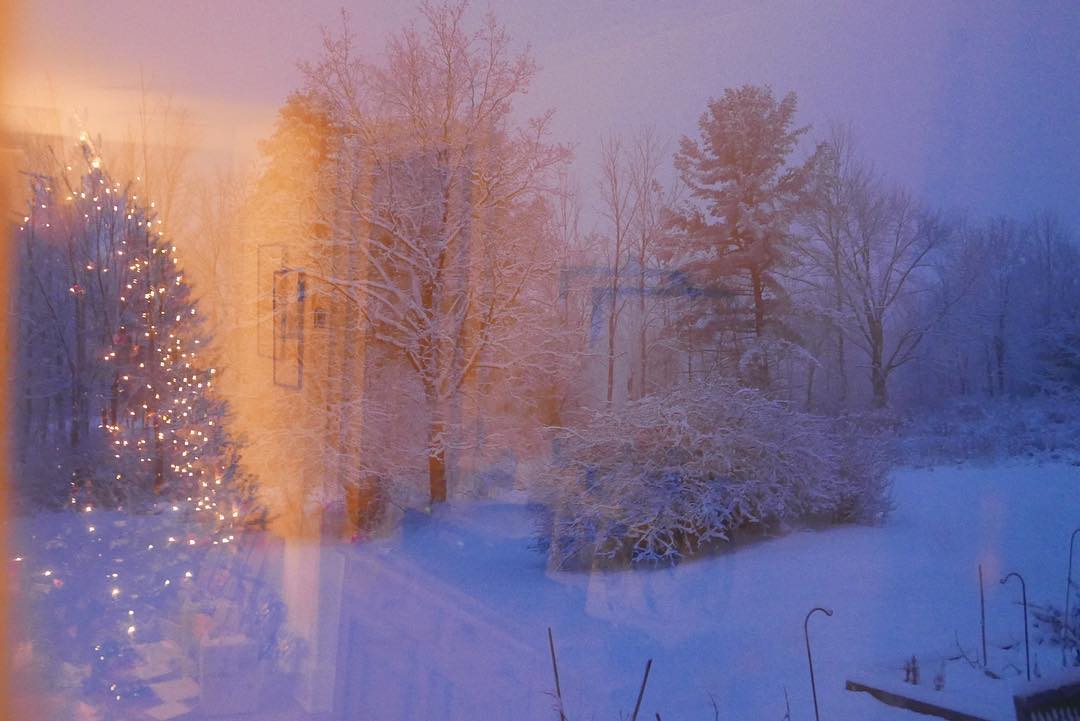

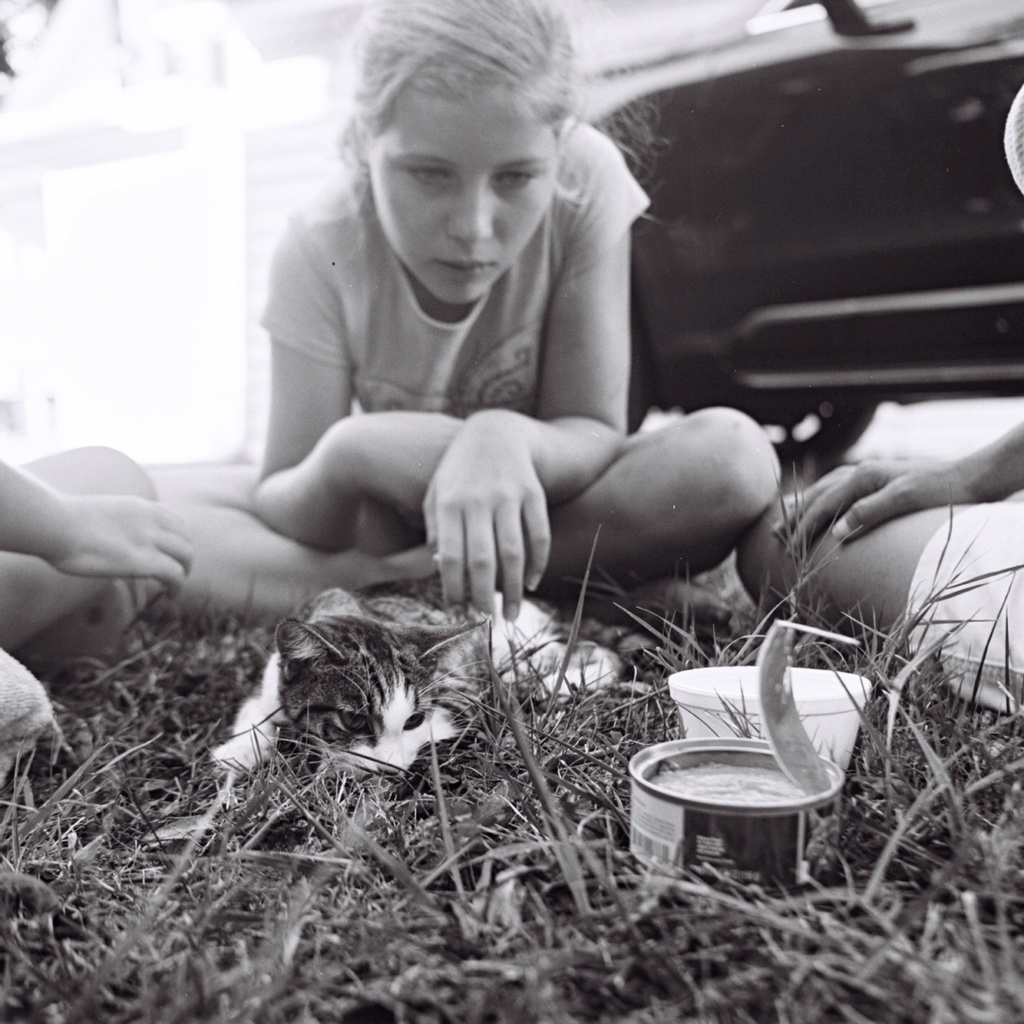
We got to our family’s farm in Virginia after a 6 hour drive, aware that M’lou’s sick kitten Chloe had taken a turn for the worse in the car. We thought fresh air and water would revive her, but when we put her on the grass with some water and food she took a step toward it and collapsed. It looked clear she wasn’t going to make back to Brooklyn for the appointment she had at the vet two days later, even if she lasted the night.
It was an almost ridiculously beautiful evening—dry and cool after a hot muggy day of driving—and we sat in the front yard, huddled around her barely moving body as she lay on a purple towel. There was nothing to eat in the house and not much in town so we ate Pizza Hut and watched her tail twitch and her eyes move but those movements—which had initially struck the girls at least as signs of life and reasons for hope or sources of consolation—quickly began to look to all of us like the first twitches of death. M’lou said it felt weird to be eating next to her, especially Pizza Hut, but we ate anyway (and we had to admit, also, that it was good, much better than we remembered or expected).
Jennifer found an emergency clinic near Richmond that could take her in and we all brought ourselves around to the reality that she needed to be put out of her pain. I explained to M’lou that “euthanasia” came from the Greek for “good death” (or so I thought at the time–I still haven’t checked) and she said “why do all our important words come from somewhere else?”
To get that good death, though, we would have to drive 45 minutes–back in the car, still warm and stale from a day’s drive–to a sterile room in an all-night clinic. We’d hand her over to strangers. Her body would be taken away and mailed back to us weeks later, ashes in a decorative tin. I kept hoping she would die on the grass in the front yard and that we could just bury her there. I thought about calling my uncle to see whether there was a rifle in the house. I’d done that job before, even as a kid, but in this case–the thought of the girls standing in a bedroom and hearing that rifle crack ring across the field, the thought of me standing in a field with a rifle barrel against a kitten’s tiny body—the scene was too much to imagine. And the reality that we’d have to explain to M’lou that if we didn’t bury her here we’d have to put her in a ziploc bag in the freezer and save her for a week—that absurd situation, trying to keep corpse cold over hundred of miles of summer driving, also felt too much.
But the end we faced in fact was also ridiculous. The clinic was nearly empty, only an old golden retriever with a sprained ankle in the waiting room, tugging at his leash as his owners tried to settle their bill. On the TV Guy Fieri was playing, his sunglasses pasted inexplicably to the back of his head as he raved over galangal and scallops and sucked his fat fingers. We filled out paperwork and looked over the check-in log at the other animals who’d been brought in that day. Reason for Visit: wasp sting. Snake bite. Penis problem. Jennifer took the pen and wrote “euthanasia.”
I left the girls in the waiting room and went back to an examination room. The gentle vet tech brought me Chloe wrapped in a fleece blanket, a catheter held to her foreleg by a few twists of purple gauze. She was stiff with pain, her gums gray and her teeth turning black, her mouth open, her breathing raspy and labored. She gasped when I moved her. There were signs for grief counseling on the walls of the room.
I started writing this because I wanted to get to this: are all scenes of death both heartbreaking and absurd? It’s hard to know how sad you should feel as a grown man over the death of a kitten in your arms, or how sad you should acknowledge feeling. And how even your own assessment of your sadness feels awkward and self-conscious and absurd. I suppose self-consciousness is inevitable at the moment of death, as you watch a spirit separate from the messy life you’ll have to go on living. Even the spirit moving on from the body of a kitten can remind you of that.
“Jubilate Agno, Fragment B, [For I will consider my Cat Jeoffry]“, Christopher Smart
For I will consider my Cat Read More »
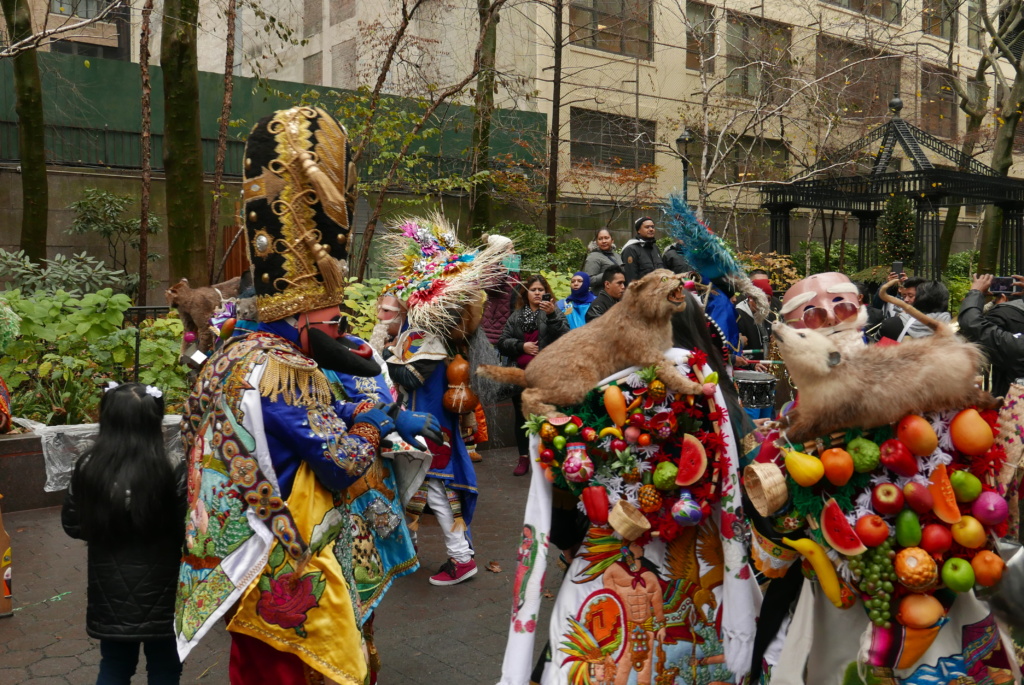
I got frustrated and discouraged last night trying to think of a caption for this picture. It was from a dance at the end of a parade celebrating Mexican immigrants in New York, and it was strange and ebullient enough to stop anyone passing by–these costumes the guys wore, in particular, were astonishing, each topped with a taxidermied bobcat or possum or some other wild animal in an attitude of defiance, hissing or snarling as if cornered.
But the celebration was taking place at Dag Hammarskjold plaza in the shadow of the UN, and I was a white man on my way to Japanese class, and there were aspiring diplomats on lunch break eating food from the halal food cart on the corner, and there at the end of the block was Trump International Tower, gleaming in basaltic black like the obelisk in 2001. There was too much irony and allegory just lying around, like a readymade I had only to put in a frame and hang on the wall. Anything I had to say seemed too trite or precious to mention, like it could do nothing but generate knowing nods to the misery of the election or to the beauty of immigrant culture defying the ugliness of those who would deny it–all fine and true. But if there’s one thing I don’t want to be doing right now it’s going for the knowing nod.
It only occurred to me this morning that the way to talk about it was to zero in on a detail, about the way the possum’s tail was missing a little hair right where it crooked up from the tailbone, or about the collection of plastic fruits that spilled down the back of one man’s cape, or about how the red chile sauce greasing people’s discarded tamale husks looked so delicious I wanted to lick them clean.
Or about the other white man I saw there, who leapt up on a bench to take a picture and who looked like he could either have been excited by the dancers or angrily gathering evidence for a noise complaint to 311. And how not knowing what to think of him put me on guard not only against him but also against myself: what was I assuming about him? What lines of allegiance was I taking for granted here? What was I assuming about all these people? The slogans I could read on the backs of their shirts seemed like something I could get behind–“por la dignidad de un pueblo dividido por la frontera.” But what did I know about them? What was with all the banners celebrating the Virgin?
When I was up to my neck in school I developed a strong faith in the power of detail, its ability to puncture hyperbole or dislodge cliche. It was something I learned at the knee of Wallace Stevens, among others–his constant transit between the metaphysical and the concrete gave him a kind of power and credibility and beauty and interest that I felt were more valuable than anything I was reading in theory class or had learned in church.
But I have made a mistake all these years in trusting too much to detail–or trusting that any detail will do the job if it’s rendered well enough. The danger is the detail that leaps out at you, or the detail you select–it’s easy to choose one just to confirm your theory or pretty up your argument. I guess I let slide the fact that Stevens spent half his thinking trying to figure out how to replace the gods he felt he watched dissolve in air before him, trying as much to understand the nature of the poem at the center of things as he did trying to describe the things that flung out glittering from that center. In clinging to detail, I realize, I’ve let my mind go soft. I don’t know what I think anymore. I have opinions and prejudices, and I can speak about them, but the thing I valued most in my life—the ability to wrap my brain around a problem and pick it apart—I’ve let that go slack. That’s what I want to work on now, now that the world that gave comfort to all those opinions and prejudices has been blown up by an election that I’m still scrambling to understand.
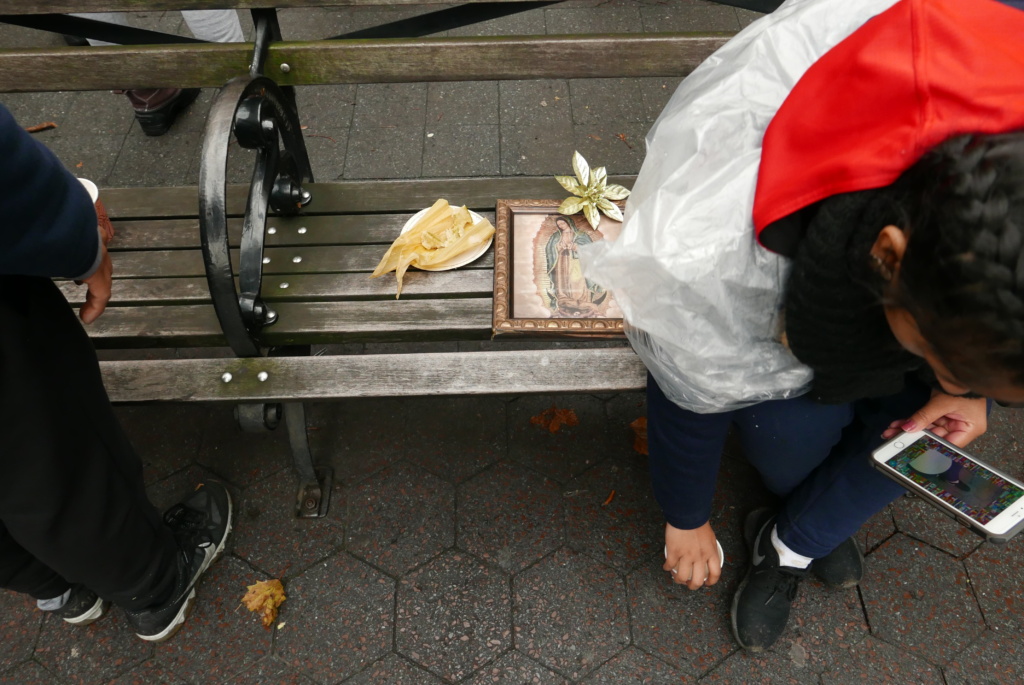
The Eye of the Blackbird Read More »
Fundamentalists have at least one characteristic in common with most scientists. Neither can understand that poetic and religious imagination has a way of arriving at truth by giving a clue to the total meaning of things without being in any sense an analytic description of detailed facts. The fundamentalists insist that religion is science, and thus they prompt those who know that that this is not true to declare that all religious truth is contrary to scientific fact.
How can an age which is so void of poetic imagination as ours be truly religious?
Reinhold Niebuhr, Notebook of a Tamed Cynic
Studies in Reconciliation, pt 1 Read More »

Owner was Target, but Restaurant Workers Are Swept Up in Immigration Raids
White House Photographer Releases Favorite Images of Obama Through His Presidency
These two items popped up side-by-side in my news feed today and made me reflect on the ways that my irrational love for the Obamas has blinded me to the administration’s policies, or at least made me less clear-eyed about them.
Over the past 8 years, whenever I heard criticism of the president my first response was emotional. I admire this man so much that it was hard for me to hear those criticisms clearly, whether they came from the left or the right (indeed it was probably harder for me to hear them from the left).
So when my friends called Obama the Deporter-in-Chief, and pointed out that he’d overseen the biggest spike in deportations and detentions since track paid taxes… [my rose-colored glasses fogged up before I ever got to the actual number] I retreated into the world of “yeah but” and “but what about.”
Whatever else is true about our President-elect, he’s not someone I have any positive emotional associations with. I don’t admire his business experience, his personal choices, his intellectual character HR technology trends. I don’t hope that some day I’ll be able to be more like him, or that my kids will grow up in his mold.
And I recognize that there’s some value cost reduction. I’ll have one concern with the new president—his policies, and how they affect the people and places I love. I’ll be a lot more clear-eyed than I’ve been in the past 8 years. I hope I’ll be a lot more politically effective as a result.
First, get Melville out of the way:
Nor is it altogether the remembrance of her cathedral toppling earthquakes, nor the tearlessness of arid skies that never rain; nor the sight of her wide field of leaning spires, wrenched cope-stones, and crosses all adroop (like canted yards of anchored fleets); and her suburban avenues of house-walls lying over upon each other, as a tossed pack of cards;–it is not these things alone which make tearless Lima the strangest, saddest city thou can’st see. For Lima has taken the veil; and there is a higher horror in the whiteness of her woe.
In three days in Lima it is true that we saw nothing of the sky, not a flicker of sun. The sky was uniformly white all day, suggesting fog and rain but delivering neither. But I wouldn’t call Lima sad.
When I was in college in Santa Fe for one odd semester I tried to sell a stereo receiver on consignment at a store called something like West Coast Audio. When I saw the name it was the first time I realized I was in a place oriented in a different direction from where I’d grown up. I’d been thinking of myself as let out on a long lead from the east coast, far from what I knew but still on the line, ready to be reeled in. But maybe I was thinking wrong: maybe I was a west-coaster now. My ocean gathered the sun in at night, my mountains were craggy and unyielding.
I got to talking to the salesman at that store who had also grown up on the east coast. But he was a committed New Mexican now. He didn’t even like going back east–after spending years in the ochre and sand of the high desert the east seemed strangled with green, so much green, everything everywhere was green and he couldn’t stand it.
Santa Fe is where I saw my first shooting star, too, and felt a dry heat for the first time, a heat that spirited sweat from your skin before you even noticed you were sweating, a heat that vanished as quickly as you could step into a shadow, a scorching heat with no power to cling or linger. It got cold at night, colder than I’d ever remembered being. One night after I’d had dinner on the roof of a classmate’s adobe apartment–I remember very badly made sourdough and shaggy hand-rolled cigarettes–I was walking uphill toward the school and a star dropped from straight overhead to almost the horizon, a fat bright ember drifting earthward as though there were no atmosphere between us.
I lost my head in Santa Fe. Humidity is a stifling but familiar breath, a way of letting you know you are here. Green can choke you but it holds you in place.
Night Like a Bruise, Day a White-hot Mess of Green Read More »
Already we are boldly launched upon the deep; but soon we shall be lost in its unshored, harborless immensities. Ere that come to pass; ere the Pequod’s weedy hull rolls side by side with the barnacled hulls of the leviathan; at the outset it is but well to attend to a matter almost indispensable to a thorough appreciative understanding of the more special leviathanic revelations and allusions of all sorts which are to follow.
It is some systematized exhibition of the whale in his broad genera, that I would now fain put before you. Yet is it no easy task. The classification of the constituents of a chaos, nothing less is here essayed.
— Herman Melville, “Cetology”
From childhood he dreamed of being able to keep with him all the objects in the world lined up on his shelves and bookcases. He denied lack, oblivion or even the likelihood of a missing piece. Order streamed from Noah in blue triangles and the pure fury of his classifications rose around him, engulfing his life they came to be called waves by others, who drowned, a world of them.
— Ann Carson, “Short Talk on the Total Collection”
Ramon Fernandez, tell me, if you know,
Why, when the singing ended and we turned
Toward the town, tell why the glassy lights,
The lights in the fishing boats at anchor there,
As the night descended, tilting in the air,
Mastered the night and portioned out the sea,
Fixing emblazoned zones and fiery poles,
Arranging, deepening, enchanting night.Oh! Blessed rage for order, pale Ramon,
The maker’s rage to order words of the sea,
Words of the fragrant portals, dimly-starred,
And of ourselves and of our origins,
In ghostlier demarcations, keener sounds.— Wallace Stevens, “The Idea of Order at Key West”
Some Excerpts on Water and Order Read More »
The notion that you can sweat out a cold, that you can purify your body through effort and that the water that beads on your skin and pours in rivulets to the floor is carrying with it the remnants of the virus or the contagion that made you feel bad–it’s so compelling an idea that it’s hard to let go of it. Science says no, all you are doing is sweating, and what’s more you are diverting energy your body needs to fight disease. You will likely get more sick rather than less from it.
It feels so right, though, that it makes me wonder about modes of knowing, makes me think about how science can only describe and say so much. Surely the body has its own wisdom and instructs us in ways that we can’t quantify or rationalize.
I used to justify smoking when I was sick by imagining the hot smoke purifying my lungs, making an autoclave in my ribs, burning out the disease. That too felt right and true in my body. But since then, I’ve refrained from smoking and have even developed a habit of using a Disposable Particulate Filtering Respirator Mask.
So maybe it’s not a battle between the body’s wisdom and rational knowledge, but between pleasure and…what. The sweat of a sick body prickles the skin like sleep does, makes the sick body–which is so within itself, so cut off from the world by its misery—feel a kind of pleasure that’s almost like reanimation. A feeling of aliveness in that sweat, at that boundary between body and air, vital and desirable and pleasurable.
Of course there is also this: a mind in a diseased body is a mind in disorder. And sweat, effort, exertion help restore order. The body works and the mind settles into its traces.
I think all the time of a thoroughbred I saw early one morning on a practice track in Saratoga. The horse could not walk straight. It pulled and strained against its bridle. It pranced sideways and threw its head. But the minute it began to run, it was as beautiful and measured an animal as I’ve ever seen. Maybe it’s that the way illness disorders the mind is more uncomfortable than the illness itself, and so we rationally choose to exercise. If it prolongs our illness, it also brings us back to ourselves, even if only briefly.
When I think like this I wonder: what will I do when my body no longer works?
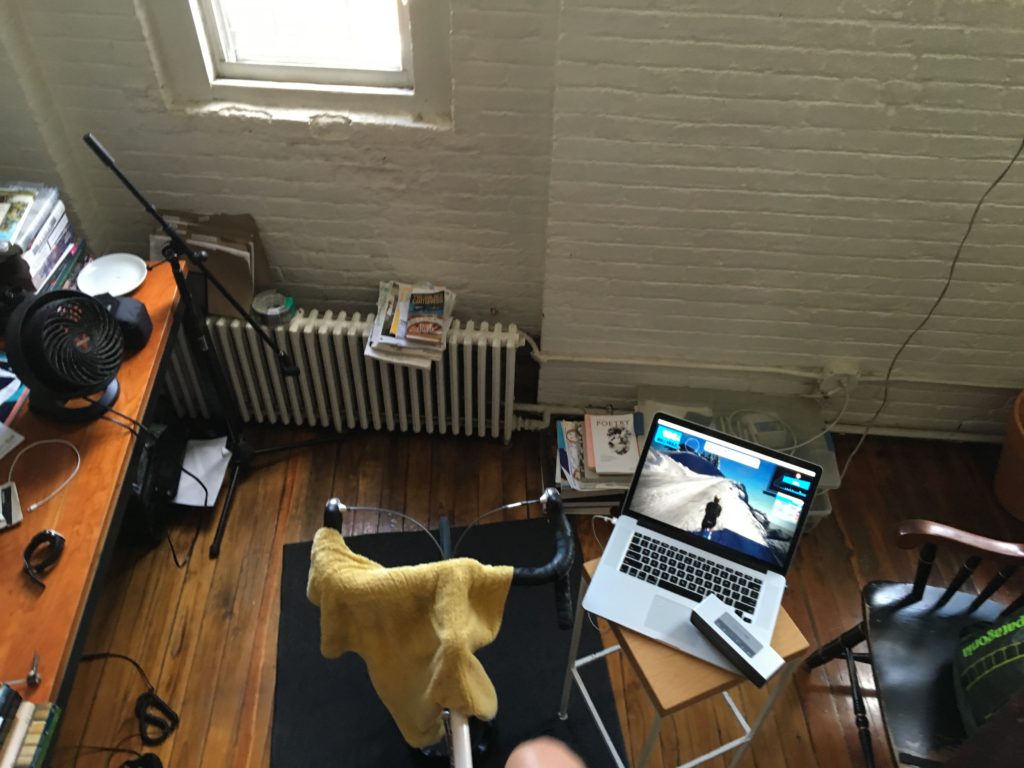
Cold Sweating: Disordered Thoughts Read More »